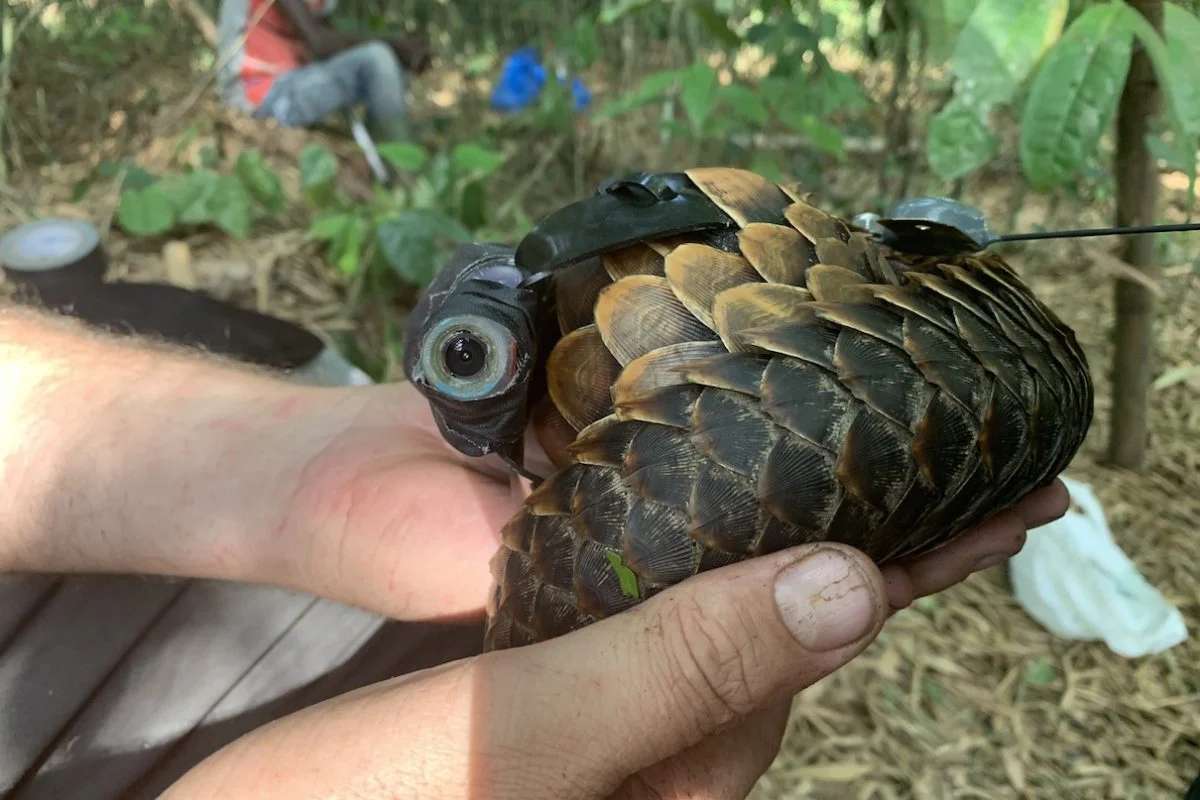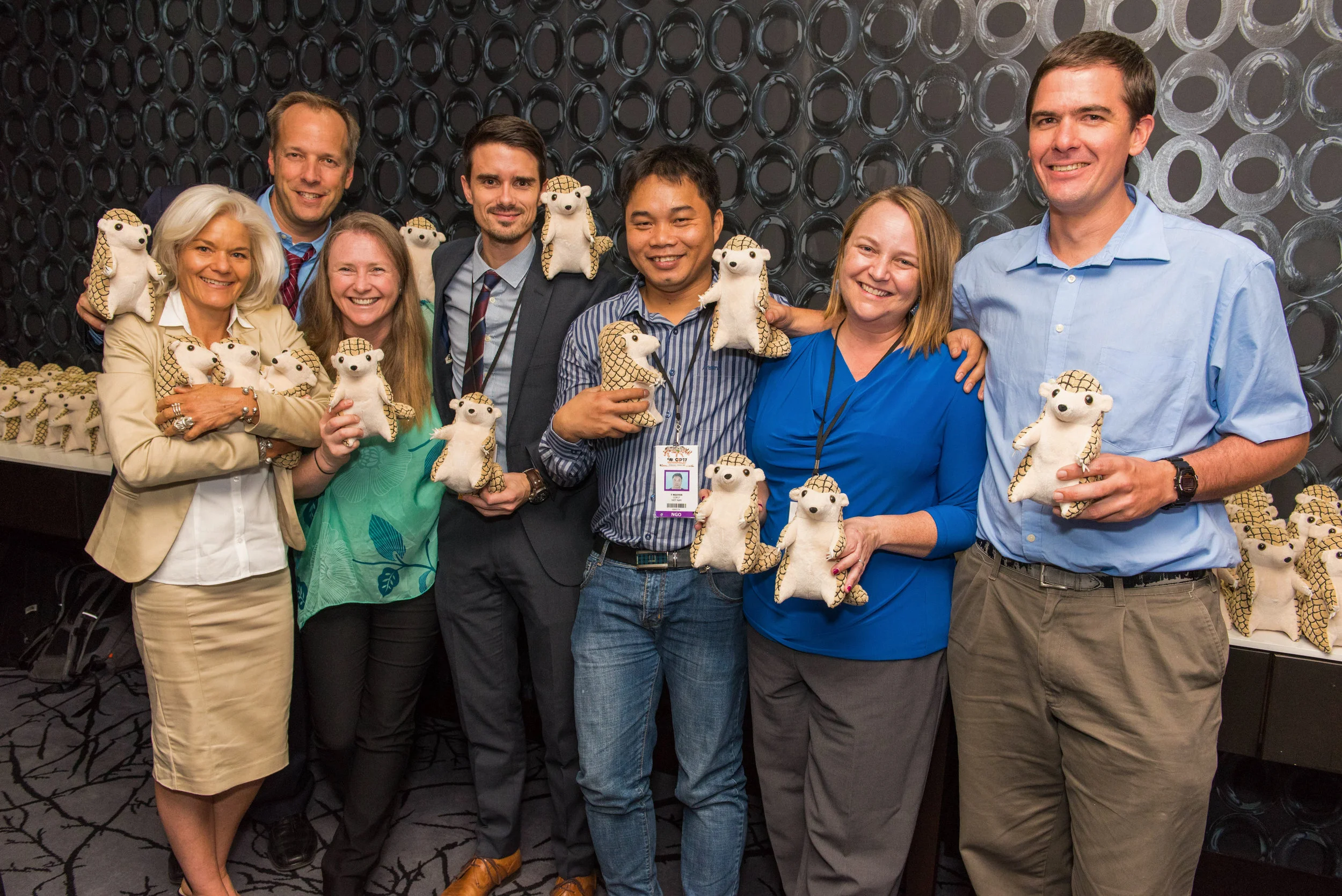More stories from the Pangolin Champions. In this post, we hear from Dr. Mark Ofua, who works with Saint Mark’s Animal Hospital in Nigeria to rescue, rehabilitate, and release pangolins to protected forests; and Carla Mousset who has been working in Gabon to inspire leadership in pangolin conservation by engaging people and communities in the creation of a Gabon Pangolin Working Group.
World Pangolin Day 2023: Conversations with Pangolin Champions - Part 1
What is it like to save pangolins around the world? In celebration of World Pangolin Day, we spoke with two of our Pangolin Champions: Kumar Paudel, who works in Nepal to document threats and enhance public engagement to save pangolins and Elisa Panjang, who works in Malaysia to reduce poaching and address illegal wildlife trade of pangolins.
Watch the Sessions from the Pangolins & the Pandemic Conference
COVID-19 and Pangolins: the Facts
Coronavirus Outbreak Triggers New Measures Against Wildlife Trade in China
On February 24th 2020, China’s top legislature announced a significant ban on the trade and consumption of wild animals. The new measures come amid growing public concern about the spread and impact of the coronavirus, COVID-19, and the consumption of wild animals. The Standing Committee of the National People's Congress (NPC) adopted a decision, which took effect on the same day, “thoroughly banning the illegal trading of wildlife and eliminating the consumption of wild animals to safeguard people’s lives and health.”
Possible Link Between Pangolins and Coronavirus
The Pangolin Crisis Fund's Plan to Save Pangolins in 2020
Pangolins in Sri Lanka Under Threat
The Indian pangolin, the only species of pangolin found in Sri Lanka, has long been hunted for meat, but is facing a rising threat from poachers transporting their scales to Asia. A team of researchers lead by Priyan Perera has been studying pangolins in Sri Lanka since 2013. The conservationists recently documented an illegal trade route from northwest Sri Lanka to India by fishing boat and then on to China, where the scales are used in traditional medicine.
First Ever Footage from Pango-Cam
A first-of-its-kind technology called the Pango-Cam offers conservationists new insight into the daily life of a pangolin. Located high on the back of the pangolin, with a view over the top of its head, this new technology will help conservationists study the behaviors and habits of pangolins. The camera is flexible, yet durable to accommodate pangolins swimming, climbing, and rolling into a ball for protection.
Pangolins at CITES CoP18
Governments reaffirmed their commitment to pangolin conservation in August at the Convention on International Trade in Endangered Species (CITES) Conference of Parties 18 (CoP18), an international conference held every three years to discuss trade restrictions on wild animals. At the conference, the IUCN SSC Pangolin Specialist Group announced that more than 500,000 pangolins have been trafficked globally in the past three years.
The Pangolin Crisis Fund: Hope for Pangolins
Times of crisis bring watershed moments, turning points that inspire change. In a crisis we rise to a challenge, banding together to prevail. And since necessity is the mother of invention, a crisis is when we spark new ideas and forge new paths forward.
Today we are announcing that together with Wildlife Conservation Network and in partnership with the Leonardo DiCaprio Foundation, we are launching the Pangolin Crisis Fund to help save one of the world’s most unique animals from extinction.
National Geographic: Poaching is sending the shy, elusive pangolin to its doom
National Geographic Magazine’s June 2019 issue includes a powerful article on pangolins — the Magazine’s first ever feature article on pangolins. Author Rachael Bale and photographer Brent Stirton convey the crisis facing pangolins through the lens of the people involved in pangolin conservation on the ground.
Save Pangolins was consulted throughout the development of the story and co-Founder Paul Thomson is quoted within the text. The article is already generating a lot of discussion online. This is an example of how powerful storytelling can shed light on an important but little-known conservation issue — as only National Geographic can do.
Dr. Jane Goodall Urges Us to Take Action for Pangolins
Watch Elisa Panjang and Paul Thomson Talk Pangolins at the 2018 Wildlife Conservation Expo
Good News for Pangolins
Ten years ago, we created Save Pangolins around a simple premise: raise awareness about pangolins. Back then, most people had never heard of a pangolin or knew that they were seriously threatened by the illegal wildlife trade. Today, pangolins are the most illegally trafficked mammal in the world for their meat and scales, and we are witnessing poaching at astonishing levels that will certainly drive them to extinction unless we intervene.
Today, however, we are here to celebrate good news.
The first regional conservation strategy for the Sunda pangolin
Save Pangolins joined IUCN SSC Pangolin Specialist Group members and other experts from 16 countries gathered in Singapore June 28-30th to create the first ever regional strategy to conserve the Critically Endangered Sunda pangolin.
The workshop was the first in a series to develop detailed, regional strategies for each of the eight pangolin species, which will also be bolstered by the development of national action plans. Together the regional and national plans will inform one consolidated global strategy for pangolin conservation in the next decade.
Why We Should All Have Pangolin Love
Today is World Pangolin Day – a time to celebrate some of nature’s most unique and lovable animals. But it is also a day for action. The desire for their meat and scales is driving pangolins to extinction, right when many people around the world are only just discovering they exist. If we don’t come together – online and in the real world – we stand to lose an animal that has been on this planet for 80 million years.
Pangolins are gentle, insect-eating mammals about the size of a house cat. They have long faces with no teeth and a sticky tongue that is longer than the length of its body when unfurled. Each pangolin can devour up to 70 million insects per year by some estimates.
All Pangolin Species Uplisted to CITES Appendix I
It was a monumental win for pangolin conservation as all 8 pangolin species were uplisted to Appendix I at the CITES Convention of the Parties in Johannesburg several days ago.
This means that all 8 species of pangolins are banned from all international commercial trade.
It was a near unanimous decision by the parties to uplist pangolins, with only one country voting against.
It was striking to see NGOs unite with the shared goal to support the uplisting of all 8 pangolin species.
Placing all pangolin species on Appendix I will encourage more stringent protections within countries where pangolins occur.
Building Tomorrow’s Pangolin Leaders
Today is World Pangolin Day, an opportunity to celebrate some of the most fascinating animals on Earth, and also some of the world’s most threatened. More than one million pangolins have been poached from the wild over the past decade, making them the most illegally trafficked mammals in the world. As a result, all eight species of pangolins are threatened with extinction.
But there is hope. Today we celebrate the emerging heroes who are working to conserve pangolins. Nine African and Vietnamese conservationists have been selected for the 2016 MENTOR-POP Fellowship program – a new initiative that builds capacity for conserving pangolins. Based in Yaoundé, Cameroon, the 15 month MENTOR Progress on Pangolins (POP) Fellowship will develop a trans-disciplinary team of early-career conservation practitioners to champion the conservation of pangolins in Central Africa.
Thousands of pangolins trafficked in Indonesia, seized and burned
People have asked us, “why pangolins?” We answer: they are the most trafficked mammals in the world – they matter, and need our help. But what does trafficking mean? It means pangolins are stolen – stolen from their habitats, stolen from the people whose traditions depend on them, stolen from the fabric of nature and culture. Driven by greed, ignorance and depravity, trafficking is a crime without mercy.
The International League of Conservation Photographers (iLCP)’s Paul Hilton has published his account of a recent bust of pangolin smugglers in Indonesia. These photos come closer than any we’ve in seen in our eight years of operations to capturing the tragedy that is pangolin trafficking.







































